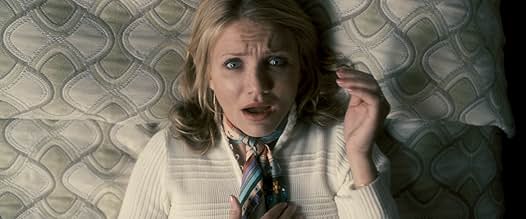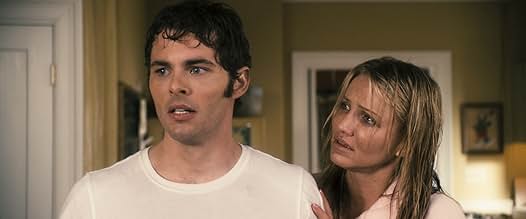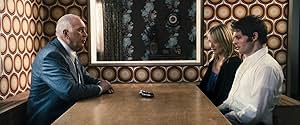With the press of a button, a wooden box bestows riches and death.With the press of a button, a wooden box bestows riches and death.With the press of a button, a wooden box bestows riches and death.
- Director
- Writers
- Stars
- Awards
- 1 win & 6 nominations total
Mark S. Cartier
- Martin Teague
- (as Mark Cartier)
- Director
- Writers
- All cast & crew
- Production, box office & more at IMDbPro
5.697.4K
1
2
3
4
5
6
7
8
9
10
Featured reviews
"To understand 'The Box,' you'll have to think outside of the box."
I'm not gonna lie. To say that this movie is confusing is like saying the sun is hot but not really. And if you've seen cult director Richard Kelly's previous films, "Donnie Darko" and "Southland Tales," you know that's gotta mean something. When I went to see this movie, there were about 50 people in the theater. Before an hour into the film, about half of the audience had already walked out. By the end, there were only 15 people left wondering what in the hell did they just see. I for one could only comprehend roughly 40% of what I saw on- screen, and even then it can only be called interpretation. So why did I give this movie a generous seven stars? Because for one, we get some spectacular performances (Marsden's great and Langella returns as a familiar creepy character), and most importantly two, because it's entirely original and Richard Kelly, undoubtedly one of the bravest directors alive, uses his creative vision to tell a story that dares to be different. Quite frankly, it's the ONLY way - only through Kelly's unique style could this story be told the way it's intended.
In the end, if you're not willing to spend some serious thought into an intelligent movie (and even then it may all amount to nothing), stay FAR away from this one. But if you want to watch a deep, rich, complex and thought-provoking piece on spirituality, existentialism, and the predictability of human nature, go see this. Be prepared for lengthy discussions with your partner however.
*Note: If by chance you've read this review, taken my recommendation, have actually seen the movie and STILL believe you've wasted 2 hours of your life, I'd be happy to share my views on the whole meaning and plot of the film. See, that's why I liked it so much - it promotes discussion! As hard as it is though, I'll try summing it up by paraphrasing a rather depressing quote by Langella's character, who explains the significance of the simple box to an employee: "Your house is a box which you live in. The car that you drove to work is a box, on wheels. When you return home from work you sit in front of a box with moving images. You watch until the mind and soul rots and the box that is your body deteriorates, when finally you are placed into the ultimate box... to rest under the soil and earth."
In the end, if you're not willing to spend some serious thought into an intelligent movie (and even then it may all amount to nothing), stay FAR away from this one. But if you want to watch a deep, rich, complex and thought-provoking piece on spirituality, existentialism, and the predictability of human nature, go see this. Be prepared for lengthy discussions with your partner however.
*Note: If by chance you've read this review, taken my recommendation, have actually seen the movie and STILL believe you've wasted 2 hours of your life, I'd be happy to share my views on the whole meaning and plot of the film. See, that's why I liked it so much - it promotes discussion! As hard as it is though, I'll try summing it up by paraphrasing a rather depressing quote by Langella's character, who explains the significance of the simple box to an employee: "Your house is a box which you live in. The car that you drove to work is a box, on wheels. When you return home from work you sit in front of a box with moving images. You watch until the mind and soul rots and the box that is your body deteriorates, when finally you are placed into the ultimate box... to rest under the soil and earth."
I liked it.....
After I heard how terrible this film was, I really wasn't expecting much. I almost didn't even rent it, but I am glad I did. I love Donnie Darko and I think with The Box, Kelly has gone back to the Darko style of writing and directing. I am not sure why it received so many bad reviews, maybe because like Donnie Darko it was too cerebral for the mainstream. It's not a movie you can do three things and watch, you have to pay attention to the little details. I do feel there are missing pieces that weren't explained, but that could be the way the film was edited and may come out later in a directors cut edition, or it could be Kelly's way of keeping the audience guessing. I can see how this movie wouldn't appeal to the masses, especially since it is a cautionary tale of morals and ethics, but if you liked Donnie Darko, you will probably enjoy The Box. I can see this having a cult following like Donnie Darko.
Also I am not a Cameron Diaz fan, but I think she did a great job. I had heard awful things about her performance in this, but in my opinion this was one of her better roles.
Also I am not a Cameron Diaz fan, but I think she did a great job. I had heard awful things about her performance in this, but in my opinion this was one of her better roles.
you have no idea what to expect...
The creator of Donnie Darko brings you a twilight zone themed tale of the oddest fashion. The film centers on a middle aged young couple living paycheck to paycheck in 1976. One day a mysterious box appears with a red button. Later on that day a spooky gentleman shows up and tells them that they have the choice to press the button and receive a million dollars but someone they don't know will die. It's a disturbing and provocative question suspensefully outlined in the trailer and TV spots. But let it be known that you just don't know what your in for until you see it. At times pretentious and a bit melodramatic the film is ultimately effective because of it's good performances and intriguing subject matter. It would be unfair to ruin any of the plot twists for you but lets just say the film will deliver on the aspects you expect it to and not completely fulfill others it begins to outline. There's a lot of apparent symbolism and subtext in the film which is both interesting and annoying as it wasn't so evident in his other superior film Donnie Darko. There isn't too much more to say without ruining the film for you. it's meant to inspire lots of cafe chatter afterwards. However, i'd also like to say It's shot well and has an appropriately aged look to it and it's worth a watch. Check it out.
Over-ambitious "Box" leaves too many elements to consider
As a fan of science fiction allegory, social experiment, "The Twilight Zone" and the thriller genre -- no less all those elements combined -- Richard Kelly and his film "The Box" should've at least won me over, but it doesn't. It can't even decide if it wants to remain completely mysterious or explicitly tell us what's going on and any film that has to contemplate that is too complex for its own good.
With any story this daring, there's potential for something meaningful. "The Box" does let you glimpse it and draw a few interesting conclusions, but through intellectual jail bars placed before our eyes by the myriad of plot contrivances. In other words, too many plot elements exist in in the film that keep us from ever putting our mind around what Kelly is trying to say. Although he starts simply by focusing on a couple (James Marsden and Cameron Diaz) and their child making an ethical decision, the scope widens to include everything from Arthur C. Clarke references to mindless drones to some indiscernible notion of the afterlife.
This beginning piece is based on Richard Matheson's story "Button, Button," which was a short story turned into a "Twilight Zone" episode. In "The Box," a mysterious man with a half-burned face played by Frank Langella drops off a box with a button in it at the doorstep of Norma and Arthur Lewis and their son Walter. He later comes back and gives Norma a proposition: don't press the button and nothing happens, or press the button and receive one million dollars and subsequently someone, anywhere in the world, whom they don't know will die.
Well, Norma, a teacher, just lost her teacher tuition discount for her son and Arthur's application to be an astronaut was just denied and despite living in a nice looking house in Richmond, Virginia they apparently have no money, so it's not hard to figure out ultimately what they'll do. After all, don't press the button and there's no film -- not that some people who sit through this would've minded that in retrospect.
As with his cult hit "Donnie Darko," Kelly keeps "The Box" fascinatingly creepy. It starts with the colors, the classic string soundtrack from the band Arcade Fire and some peculiar Easter eggs and moves on to more jarring occurrences. There is never a point where things get so absurd that you don't care what happens in the end, even if there's a chance the end could be terribly unsatisfying. It's one of few saving graces for "The Box," but perhaps even this is only for those intrigued by high concept sci-fi mystery that parallels human nature no matter how vague.
When any thriller collapses somewhere after the midway point, you can usually blame the fact that too many occurrences in need of explaining were written in order for the writer to achieve his desired end. When James Marsden gets hit in a car by a truck and comes out of a giant light warehouse and that ultimately never gets explained, its degrading to the viewer.
The real trouble with "The Box" is how ambitiously it tries to combine the ideas of intelligent life/space exploration with religious notions of life, death and what might come after as well as numerous other elements too many and too difficult to explain. Kelly found that balance between time travel and inter-relationship drama in "Donnie Darko" but "The Box" implodes on itself by severing its little social experiment from the characters with too much unexplained phenomena.
~Steven C
Visit my site http://moviemusereviews.com
With any story this daring, there's potential for something meaningful. "The Box" does let you glimpse it and draw a few interesting conclusions, but through intellectual jail bars placed before our eyes by the myriad of plot contrivances. In other words, too many plot elements exist in in the film that keep us from ever putting our mind around what Kelly is trying to say. Although he starts simply by focusing on a couple (James Marsden and Cameron Diaz) and their child making an ethical decision, the scope widens to include everything from Arthur C. Clarke references to mindless drones to some indiscernible notion of the afterlife.
This beginning piece is based on Richard Matheson's story "Button, Button," which was a short story turned into a "Twilight Zone" episode. In "The Box," a mysterious man with a half-burned face played by Frank Langella drops off a box with a button in it at the doorstep of Norma and Arthur Lewis and their son Walter. He later comes back and gives Norma a proposition: don't press the button and nothing happens, or press the button and receive one million dollars and subsequently someone, anywhere in the world, whom they don't know will die.
Well, Norma, a teacher, just lost her teacher tuition discount for her son and Arthur's application to be an astronaut was just denied and despite living in a nice looking house in Richmond, Virginia they apparently have no money, so it's not hard to figure out ultimately what they'll do. After all, don't press the button and there's no film -- not that some people who sit through this would've minded that in retrospect.
As with his cult hit "Donnie Darko," Kelly keeps "The Box" fascinatingly creepy. It starts with the colors, the classic string soundtrack from the band Arcade Fire and some peculiar Easter eggs and moves on to more jarring occurrences. There is never a point where things get so absurd that you don't care what happens in the end, even if there's a chance the end could be terribly unsatisfying. It's one of few saving graces for "The Box," but perhaps even this is only for those intrigued by high concept sci-fi mystery that parallels human nature no matter how vague.
When any thriller collapses somewhere after the midway point, you can usually blame the fact that too many occurrences in need of explaining were written in order for the writer to achieve his desired end. When James Marsden gets hit in a car by a truck and comes out of a giant light warehouse and that ultimately never gets explained, its degrading to the viewer.
The real trouble with "The Box" is how ambitiously it tries to combine the ideas of intelligent life/space exploration with religious notions of life, death and what might come after as well as numerous other elements too many and too difficult to explain. Kelly found that balance between time travel and inter-relationship drama in "Donnie Darko" but "The Box" implodes on itself by severing its little social experiment from the characters with too much unexplained phenomena.
~Steven C
Visit my site http://moviemusereviews.com
Forgettable
The movie that ended the career of the director Richard Kelly. It was never a really promising career, Donnie Darko must have been a stroke of luck. The original Twilight Zone episode The Box was way better and all the additional material in this movie does not improve on it, with subplots that don't resolve into anything. The script is just poorly written, with a lot of illogical situations and thin characters. The movie overall is not horrible, just don't have any high expectations from it.
Did you know
- TriviaThe main characters, Norma Lewis and Arthur Lewis, were based on director Richard Kelly's parents. His mother also suffered a crippled foot after an X-Ray mishap; his father worked for NASA and co-designed the camera used on the Viking Mars Landers (as in the movie).
- Goofs911 emergency services weren't available in Richmond, VA, in 1976.
- Quotes
Martin Teague: Sir? If you don't mind my asking... why a box?
Arlington Steward: Your home is a box. Your car is a box on wheels. You drive to work in it. You drive home in it. You sit in your home, staring into a box. It erodes your soul, while the box that is your body inevitably withers... then dies. Whereupon it is placed in the ultimate box, to slowly decompose.
Martin Teague: It's quite depressing, if you think of it that way.
Arlington Steward: Don't think of it that way... think of it as a temporary state of being.
- SoundtracksLight in Your Eyes
Written by Stephan Sechi (as Stephan M. Sechi)
Performed by Stephan Sechi
Courtesy of Crucial Music Corporation
- How long is The Box?Powered by Alexa
Details
- Release date
- Country of origin
- Official site
- Language
- Also known as
- La caja
- Filming locations
- Production companies
- See more company credits at IMDbPro
Box office
- Budget
- $30,000,000 (estimated)
- Gross US & Canada
- $15,051,977
- Opening weekend US & Canada
- $7,571,417
- Nov 8, 2009
- Gross worldwide
- $33,334,176
- Runtime
- 1h 55m(115 min)
- Color
- Sound mix
- Aspect ratio
- 2.35 : 1
Contribute to this page
Suggest an edit or add missing content











































